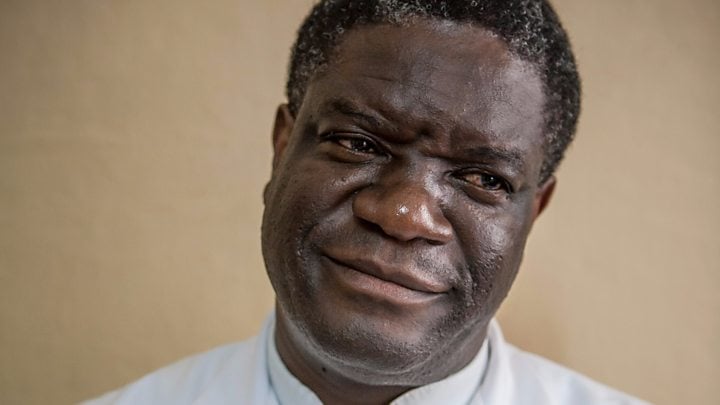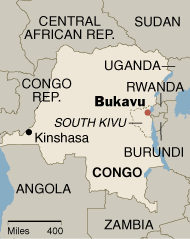
In October of last year, the Nobel Committee awarded Dr. Denis Mukwege with the Nobel Peace Prize. Dr. Mukwege is a world-renowned gynecologist from the Democratic Republic of Congo (DRC) who established the Panzi Hospital, which practices a holistic approach to providing assistance to survivors of sexual assault. Congo has been deemed by the international community as the worst place in the world to be a woman, with 1100 women raped every day. Dr. Mukwege is one of only two doctors in Congo that can perform reconstruction surgeries after a woman has been raped, and his work has fundamentally changed access to health services in the country by making them more widespread and affordable. One of the programs the Panzi Hospital executes is focused on HIV/AIDS prevention and treatment, which has been a chronic epidemic in the DRC. Despite this progress, the actual policies that the international community have implemented in the DRC have been lacking, excluding, and often counterproductive to survivors of rape who have contracted HIV/AIDS.
Rape is often employed as a devastating weapon of war in Congo. This tactic has fostered a clear link between conflict promulgation and AIDS transmission. Human Rights Watch estimates, approximately 60% of combatants in the DRC have AIDS. The spread of AIDS has been a significant issue in Congo for decades, officially declared a public health threat in 1983. The link between sexual violence and AIDS in Congo is apparent, as “an estimated 30% of survivors of rape in Congo are infected with HIV“. Virginie Supervie at the National Institute of Health conducted a study that statistically predicts the number of HIV/AIDS victims in relation to sexual violence relates in Sub-Saharan Africa. Her results are alarming, estimating that under extreme conditions, 10,000 women and girls in Congo who are victims of sexual violence could contract HIV/AIDS each year. She further argues that in order to effectively deal with the AIDS epidemic in Congo, victims of sexual violence are critical to take into account during policy formation, as they are often left out of the discourse around AIDS prevention and treatment.
In Congo, victims of sexual violence are often ostracized by their communities, forcing them to move. This practice creates major obstacles to providing critical medical treatments. Jack Hyyombo explains in the Central African Journal of Public Health, that the most effective way to address this issue is a more targeted approach based on province should be implemented rather than blanket policies over the entirety of Congo. Different demographics in Congo have diverse needs. Creating targeted approaches based on province would allow the Congolese government to create a more tailored approach to meet the needs of different people living in different areas. From there, the government could concentrate specifically on areas where sexual violence occurs most often.
Congo has primarily used only blanket policies to address HIV/AIDS in the country. Joseph Kabila implemented a program headed by the Ministry of Health and the National AIDS Commission. This was supported by the World Health Organization (WHO) and the United Nations (UN). Similarly, to many countries in the international community, the Congolese government expressed in 2015 that they aimed to eliminate HIV and AIDS as a public health threat by the year of 2030. In 2015, only 33% of known AIDS patients were taking antiretrovirals in the DRC. The government publically stated that “by April 2017, 34000 more people were on treatment which puts the country on track to reach the June 2018 target, which would see 73% of people living with HIV on treatment”. The fact that more Congolese citizens are receiving treatment is obviously a benefit, but victims of sexual assault are often not included. For example, “only 30% of female rape cases undergo prophylactic treatment against HIV in the DRC”. This is due to a top-down, homogenous approach by the UN and WHO. Blanket statements regarding progress on AIDS treatment and prevention in the Congo have unintended consequences. The woman who are often most at risk of the disease are forgotten about because there is a false sense that everyone is benefitting from the progress that has occurred.

At first glance, it looks as if the United Nations is taking a hardline, effective approach to combating AIDS stigmatization and sexual violence. In 2010, the first ever offensive peacekeeping mission, MONUSCO, was deployed in Congo. This mission was the first of its kind, as UN peacekeepers usually have to wait until conflict comes to them, while MONUSCO can be the aggressor against the groups it is trying to eradicate in order to protect the population. There is also a designated Sexual Violence Unit in MONUSCO. However, though the United Nations says that MONUSCO is helping, there are many points of contention surrounding the mission.
The implications of MONUSCO on the debate about responses to rape victims with AIDS is substantial. The rhetoric around MONUSCO makes it seem very beneficial, while in reality, peacekeepers often exacerbate existing issues. In only the first three months of 2017, five peacekeepers had already been accused of raping Congolese women. This is not limited to peacekeepers in the DRC. The Associated Press reported that “between 2004 and 2016, the United Nations received about 2,000 allegations of sexual exploitation and abuse against its peacekeepers”. Over 700 of those allegations occurred in Congo and number is assumed to be much higher as victims are often silenced or discouraged from coming forward.
There are many implications of peacekeepers contributing to sexual violence. One of the main consequences is that it promotes a mistrust of foreign actors. This is detrimental when worldwide policies are being developed to address both AIDS and sexual violence. Multilateral and transregional approaches are necessary when trying to tackle epidemics that span across the world because they provide resources. Furthermore, the perpetrators of these violent acts are often not held responsible, promoting an environment in which rapists are greeted with impunity.
There is no doubt that Dr. Mukwege is an extraordinary hero well deserving of the Nobel Prize. Resources are critically required to invest in other doctors to expand medical practice in Congo as well. This is the only way rape victims who have HIV/AIDS will no longer be left out of the dialogue of progress. While Dr. Mukwege’s awarding of the Nobel Peace Prize has brought more attention to sexual health in the DRC, international responses to treat rape victims who have contracted HIV/AIDS have been lacking and often counterproductive. Broad statements about progress, and human rights abuses committed by those who are supposed to be there to help contribute to an environment where rape victims with AIDS are left out of the discourse about access to health infrastructure. Women are essential to include in these discussions as they often experience the worst parts of conflict. Only when rape victims and AIDS patients are advocated for, will comprehensive policies be effectively implemented to benefit all citizens in the Democratic Republic of Congo.